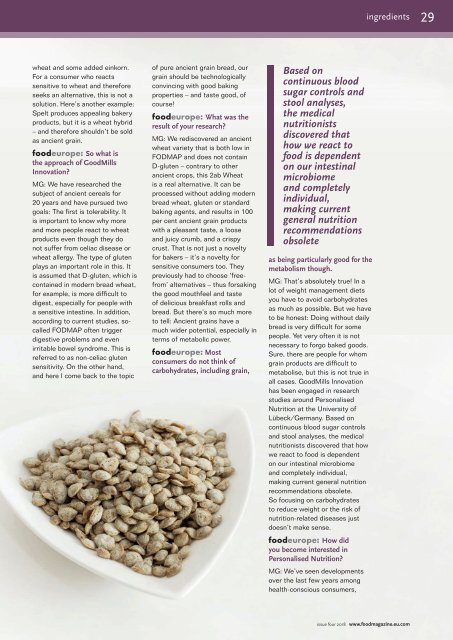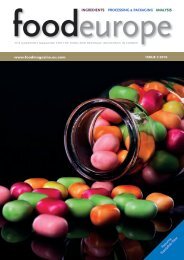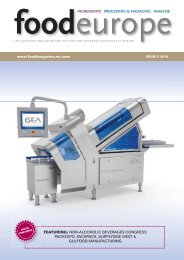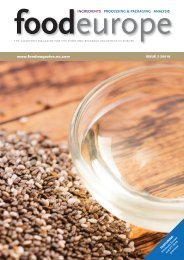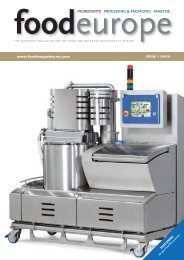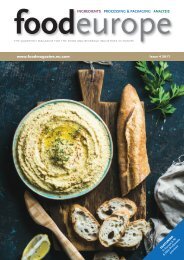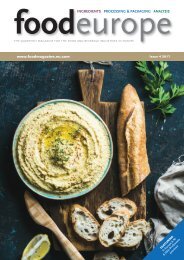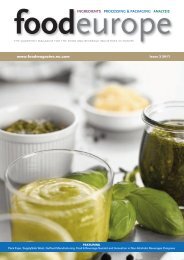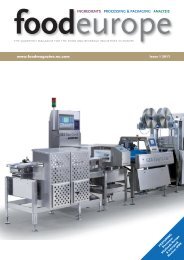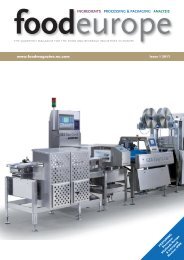Issue 4 2018
Create successful ePaper yourself
Turn your PDF publications into a flip-book with our unique Google optimized e-Paper software.
ingredients<br />
29<br />
wheat and some added einkorn.<br />
For a consumer who reacts<br />
sensitive to wheat and therefore<br />
seeks an alternative, this is not a<br />
solution. Here’s another example:<br />
Spelt produces appealing bakery<br />
products, but it is a wheat hybrid<br />
– and therefore shouldn’t be sold<br />
as ancient grain.<br />
foodeurope: So what is<br />
the approach of GoodMills<br />
Innovation?<br />
MG: We have researched the<br />
subject of ancient cereals for<br />
20 years and have pursued two<br />
goals: The first is tolerability. It<br />
is important to know why more<br />
and more people react to wheat<br />
products even though they do<br />
not suffer from celiac disease or<br />
wheat allergy. The type of gluten<br />
plays an important role in this. It<br />
is assumed that D-gluten, which is<br />
contained in modern bread wheat,<br />
for example, is more difficult to<br />
digest, especially for people with<br />
a sensitive intestine. In addition,<br />
according to current studies, socalled<br />
FODMAP often trigger<br />
digestive problems and even<br />
irritable bowel syndrome. This is<br />
referred to as non-celiac gluten<br />
sensitivity. On the other hand,<br />
and here I come back to the topic<br />
of pure ancient grain bread, our<br />
grain should be technologically<br />
convincing with good baking<br />
properties – and taste good, of<br />
course!<br />
foodeurope: What was the<br />
result of your research?<br />
MG: We rediscovered an ancient<br />
wheat variety that is both low in<br />
FODMAP and does not contain<br />
D-gluten – contrary to other<br />
ancient crops, this 2ab Wheat<br />
is a real alternative. It can be<br />
processed without adding modern<br />
bread wheat, gluten or standard<br />
baking agents, and results in 100<br />
per cent ancient grain products<br />
with a pleasant taste, a loose<br />
and juicy crumb, and a crispy<br />
crust. That is not just a novelty<br />
for bakers – it’s a novelty for<br />
sensitive consumers too. They<br />
previously had to choose ‘freefrom’<br />
alternatives – thus forsaking<br />
the good mouthfeel and taste<br />
of delicious breakfast rolls and<br />
bread. But there’s so much more<br />
to tell: Ancient grains have a<br />
much wider potential, especially in<br />
terms of metabolic power.<br />
foodeurope: Most<br />
consumers do not think of<br />
carbohydrates, including grain,<br />
Based on<br />
continuous blood<br />
sugar controls and<br />
stool analyses,<br />
the medical<br />
nutritionists<br />
discovered that<br />
how we react to<br />
food is dependent<br />
on our intestinal<br />
microbiome<br />
and completely<br />
individual,<br />
making current<br />
general nutrition<br />
recommendations<br />
obsolete<br />
as being particularly good for the<br />
metabolism though.<br />
MG: That’s absolutely true! In a<br />
lot of weight management diets<br />
you have to avoid carbohydrates<br />
as much as possible. But we have<br />
to be honest: Doing without daily<br />
bread is very difficult for some<br />
people. Yet very often it is not<br />
necessary to forgo baked goods.<br />
Sure, there are people for whom<br />
grain products are difficult to<br />
metabolise, but this is not true in<br />
all cases. GoodMills Innovation<br />
has been engaged in research<br />
studies around Personalised<br />
Nutrition at the University of<br />
Lübeck/Germany. Based on<br />
continuous blood sugar controls<br />
and stool analyses, the medical<br />
nutritionists discovered that how<br />
we react to food is dependent<br />
on our intestinal microbiome<br />
and completely individual,<br />
making current general nutrition<br />
recommendations obsolete.<br />
So focusing on carbohydrates<br />
to reduce weight or the risk of<br />
nutrition-related diseases just<br />
doesn’t make sense.<br />
foodeurope: How did<br />
you become interested in<br />
Personalised Nutrition?<br />
MG: We’ve seen developments<br />
over the last few years among<br />
health-conscious consumers,<br />
issue four <strong>2018</strong> www.foodmagazine.eu.com


